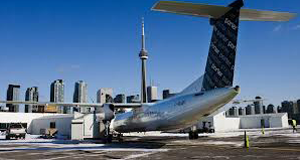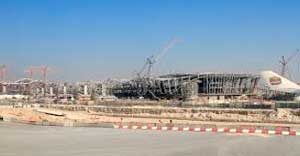Brian Iler —
The Ontario government is about to enmesh itself in the Island airport controversy by giving itself the power to give that airport a huge property tax break.
The Ontario government has studiously avoided getting mixed up in the Island Airport mess – but Bill 144 changes all that. We’re surprised. But we’re even more surprised as that tax break runs counter to its commitment to remove existing incentives to fossil-fuel use.
There are many ways in which the carbon economy is subsidized by governments.
One of them is aviation.
Aviation is one of the fastest-growing contributors to world-wide emissions.
Unchecked it can grow to a substantial proportion of global emissions, making a climate-safe future difficult or impossible—and undermining reductions achieved in other sectors. As reported today, the aviation sector has been an outrageous laggard in coming to grips with the urgency of addressing climate change.
While the Ontario government has recognized the need to reduce subsidies for the consumption of fossil fuels, it continues to subsidize airports by mandating a vastly reduced property tax regime for them.
In effect, it requires four cities with airports within their borders – London, Thunder Bay, Ottawa, and Toronto (Pearson) – to massively subsidize them through reduced property taxes3.
According to the City of Toronto Pearson paid more than 70% less than market value assessment would mandate.
Now, it proposes to expand the number of airports eligible for that subsidy: Bill 144, currently before the Ontario legislature, would amend the Assessment Act to allow more airports to be added by Regulation 5.
Essentially, the province appears to be proposing to add the Island airport to the short list of other provincial airports that avoid paying property taxes on the same basis as other taxpayers.
A prime reason there are very few city centre airports is that the land is so valuable. Here, all the land comprising the Island airport and the city-side parking lots comes free, mostly from the federal government, and some from the city on long-term nominal-rent leases.
Reducing the amount of property taxes the Island airport pays to the city to a level substantially below that which everyone else pays means the province is opting to force the city to further subsidize the Island airport’s operations – when we know that there is ample capacity at Pearson.
Last year, Ports Toronto requested that the province add the Island Airport to the list of airports getting property tax breaks.
After years of fighting Ports Toronto (previously the Toronto Port Authority) to collect its fair share of taxes, the City of Toronto capitulated and joined with Ports Toronto in that request.
On July 23, 2014, CommunityAIR wrote to Finance Minister Sousa, as follows:
“We urge you not to allow the Toronto Port Authority [now Ports Toronto] to avoid its responsibilities to the citizens, and taxpayers, of the City of Toronto.
“Instead, we request that you join the Federation of Canadian Municipalities campaign to insist that the federal government and its agencies pay their fair share of taxes to Canadian municipalities.
The Toronto Port Authority has resisted paying its fair share of property taxes for the Island airport to the City of Toronto for many years now.
The arrears, based upon that normal regime, exceed $50,000,000.
The Port Authority’s failure to pay amounts to a massive subsidy of the Island airport operations by the taxpayers of the City of Toronto.
While the City of Toronto has vigorously pursued these arrears, with several favourable judgments in the courts. Toronto city council recently and inexplicably capitulated, agreeing to place this issue in your government’s hands for resolution.
***The letter is attached.
No response was ever received from Minister Sousa. Instead, Bill 144 has received a second reading.
1) According to a report by the Tyndall Centre,
If the aviation industry is allowed to grow at rates even lower than those being experienced today, the EU could see aviation accounting for between 39% and 79% of its total carbon budget by 2050, depending on the stabilization level chosen. For the UK, the respective figures are between 50% and 100%.
2) From Ontario’s Climate Change Strategy, Nov. 25, 2015 version:
Our strategy recognizes the negative impact of fossil fuels on the climate. We will look at removing existing initiatives that support fossil fuel use.
3) Under the Ontario Assessment Act, four airports—London, Thunder Bay, Ottawa, and Toronto Pearson—are entitled to pay property taxes to the local municipality at a rate based on the number of passengers using the airport, rather than being based on the fair market value of the property occupied by the airport.
The rates are:
Designated Airport Authority
Passenger Rate
Greater London International Airport Authority
$1.66998
Greater Toronto Airports Authority
$0.94029
Ottawa International Airport Authority
$1.07735
Thunder Bay International Airports Authority
$0.55403
4) From a Jan.11, 2006 report to Toronto City Council:
For the period 2001-2004, the average annual payment in lieu of taxes received for GTAA property located within the City of Toronto was approximately $133,463, based on the current Assessment Act regulations. If the payment in lieu of tax amount was calculated using the Current Value Assessment (CVA) times the applicable tax rate, it is estimated that the PILT amount would be $457,029.
5) Schedule 1 of the bill contains the revision. The explanatory note tells the story:
“Subsection 3 (1) of the Act currently exempts land owned or leased by designated airport authorities within the meaning of the Airport Transfer (Miscellaneous Matters) Act (Canada). Amendments are made to also exempt other authorities that operate airports and that are prescribed by the regulations. The amendment applies to taxation years after 2012. Under that federal Act, the Minister may designate any corporation or other body to which the Minister is to sell, lease or otherwise transfer an airport as a designated airport authority – the Island Airport isn’t one.
6) Eileen Waechter, Pearson’s director of airport planning: “Pearson projected in 2008 that it would need to add a sixth runway, but it appears that may not be necessary for at least another two decades” quoted in Globe and Mail, Oct. 8, 2015
7) Statement by FCM president Karen Leibovici following the Supreme Court’s decision on the federal Payments in Lieu of Taxes Act on June 15, 2012:
“Today’s Supreme Court unanimous ruling on the Payments in Lieu of Taxes Act confirms the responsibility of the federal government to compensate municipalities fairly for federal properties within their communities. This ruling signals that the Government of Canada cannot arbitrarily set a value on its properties, and must pay their taxes like any property owner.
“Municipal governments stand ready to work with the federal government to improve its Payments in Lieu of Taxes (PILT) system, so that it meets the needs of both federal property owners and the local governments that provide them with critical services.
“The court’s decision will help cities and communities across the country collect the funds they are fairly owed for the services they provide to federal properties, like fire protection, policing and transportation access.
“Fair and predictable PILT revenues are crucial for municipalities to meet their growing list of responsibilities, many of which are downloaded by other orders of governments, while collecting just eight cents of every tax dollar paid by Canadians.”
“Successful lobbying by municipalities that had long suffered from the presence of federal government property led to the enactment of this Regulation under the Payments in Lieu of Taxes Act:
‘a payment made by a corporation [i.e. the TPA] in lieu of a real property tax for a taxation year shall be not less than [our emphasis] the product of:
‘(a) the corporation effective rate7 in the taxation year applicable to the corporation property in respect of which the payment may be made; and
‘(b) the corporation property value”
7) in the taxation year of that corporation property.”
This says clearly that the TPA must pay its taxes (known Payments in Lieu of Taxes or “PILTs”) on the same basis as every other taxpayer.
8) At a meeting of Toronto and East York Community Council on March 20, 2012, a city finance official stated that the city had billed $58M in property taxes on the Island airport lands for the period to the end of 2010, while the TPA had paid only $9M
9) The City of Toronto successfully intervened in two cases in the Supreme Court of Canada:
In the first case, decided in 2010, Montréal (City) v. Montreal Port Authority, the court stated:
“Parliament intended Crown corporations and managers of federal property to make payments in lieu on the basis of the existing tax system in each municipality, to the extent possible as if they were required to pay tax as owners or occupants.[para. 42]
“Thus, the purpose of the PILT Act is to establish a system of payments in lieu that reflects the actual tax situation in the places where federal property is located.” [para. 46]
In the second case, decided in 2012, the Court in Halifax (Regional Municipality) v. Canada (Public Works and Government Services) stated:
“Just as fairness to the Federal Crown demands that the Minister retain the discretion to come to his own opinion on property value, fairness to municipalities demands that the Minister’s opinion be informed by the tax system that would apply to the federal property in issue if it were taxable …
“But the Act is directed to fair and equitable PILTs with reference to what taxes would be payable if the site were taxable” …
“The Minister’s position is also at odds with the broader policy of the PILT Act, which is to treat municipalities fairly. It can hardly be thought either fair or equitable to conclude that 42 acres in the middle of a major metropolitan centre has no value for assessment purposes.
The city, having won at the Federal Court of Canada on this precise issue in 2010, hasn’t taken that court’s decision back to the Disputes Resolution Tribunal in relation to the Island Airport lands.
Brian Iler is Chair of CommunityAIR
 TheBulletin.ca Journal of Downtown Toronto
TheBulletin.ca Journal of Downtown Toronto

